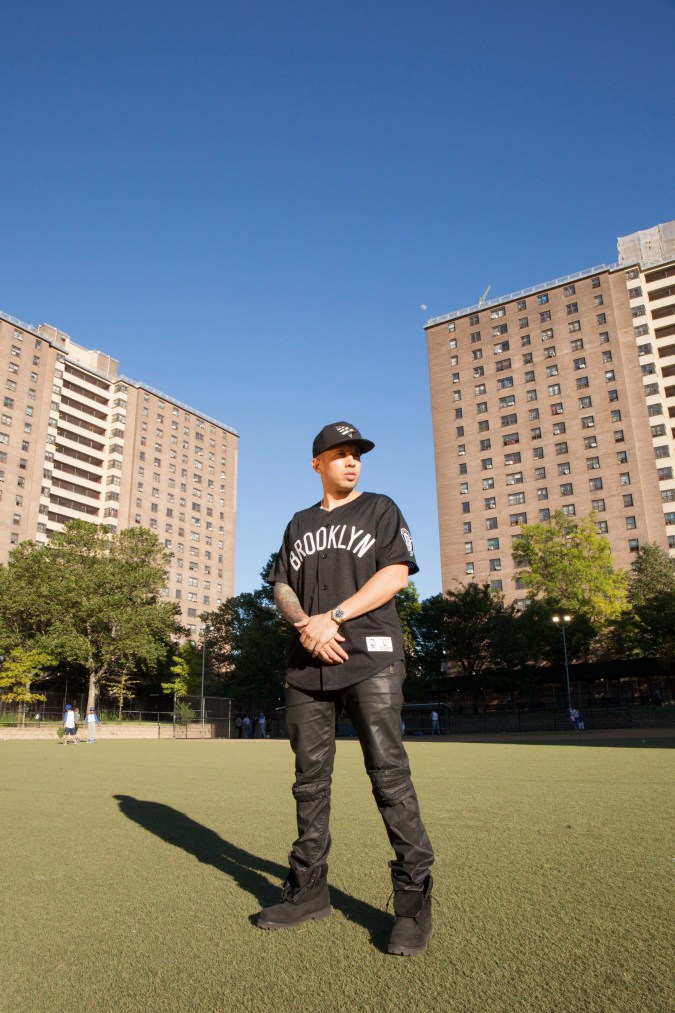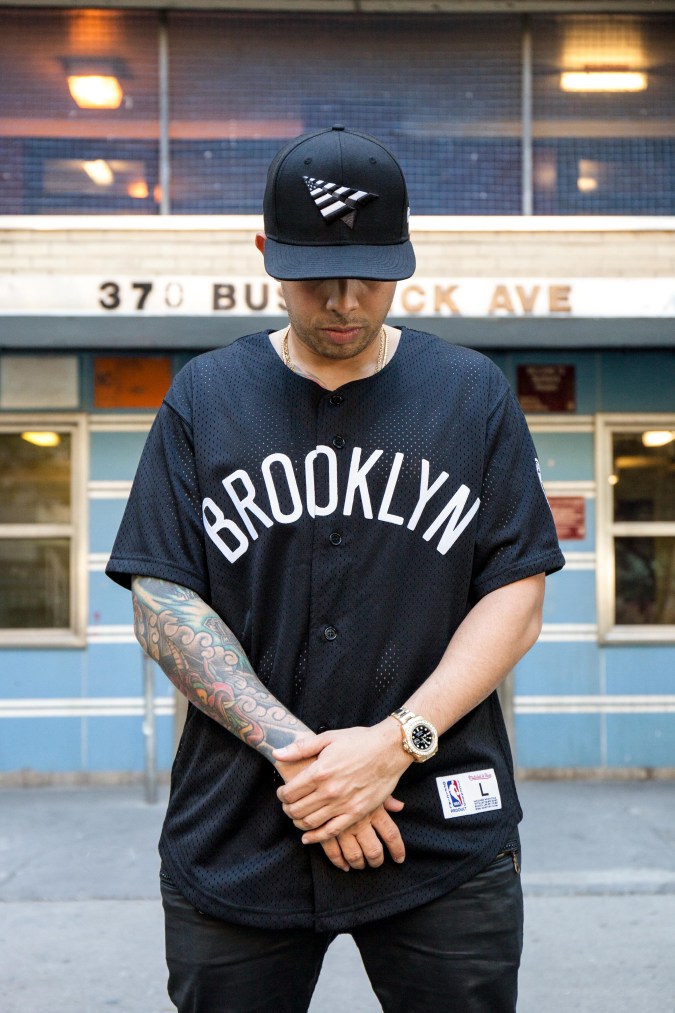Romantiqueo urbano visionary De La Ghetto (aka Rafael Castillo) has managed to keep a foot in both reggaetón and hip-hop for nearly 15 years, even as these genres have evolved outside of their traditional contexts. As a longtime supporter of hip-hop and dancehall in a reggaetón-dominated Puerto Rico, De La Ghetto’s endurance is a testament to his battle-tested versatility, and a steadfast faith in the transformative power of MySpace piracy.
Castillo credits his artistic beginnings to his time as a recording duo with Arcángel, where he honed his “little bit of everything” style. “I can do your street, hood reggaetón or hip-hop, and I can do the R&B and the romantiqueo, a little X-rated,” he explains. “I just do what I feel. Sometimes you gotta grow and mature…you gotta learn how to explore new horizons.”

Signing on early to Zion’s Baby Records Inc., De La Ghetto and Arcángel were among the first reggaetoneros to see the potential in digital music streaming – and bootlegging – platforms as a means to expand their reach. They soon began testing the limits of traditional music distribution circuits, uploading tracks like “Ven Pégate” – their contribution to Héctor el Father’s 2005 Sangre Nueva compilation – to streaming and pirate download platforms directly. It was a subversive move designed to get the songs directly to people without the means to purchase their music.
“When I started with Arcángel, we were independent; we were in La Perla, living, grinding, no money, no label – strictly everything was street,” he says. Thanks to platforms like YouTube and MySpace, their aspirations to reach beyond their immediate surroundings culminated quickly. “I remember we used to stay up all night on MySpace. We only had one computer in Zion’s office; we had cats from Colombia, Peru, Chile commenting on our music. A lot of big artists used to come to us and be like, ‘What are you doing? You’re fucking up the game with all this bootlegging.’ But thanks to all those bootleg pages, we started booking shows, and we started getting money off of that.”

Today, streaming’s ubiquity has rewired the expectations for distribution and revenue-generating mechanisms in the music industry, and Castillo has a clear message for the haters from those old days: “Helloooo – I told y’all motherfuckers we had to bootleg! There was no other choice. That was the only way to give our music out to the world.”
“We were Drake-ing way before Drake.”
De La Ghetto’s foresight went beyond distribution to experimentation in cross-genre romantiqueo. While flows that hover between rapping and singing are de rigueur today, in the mid-00s it was an unfamiliar sound. At the time, sugary tracks like the now classic “Sensación del Bloque” and “Aparentemente” were both risky and revolutionary, a precursor to the trap baladas now revolutionizing the Latin music industry. “[Me and Arcángel] were Drake-ing way before Drake,” Castillo jokes, recalling the backlash that even Drake received when he first arrived on the scene peddling a so-called “softer” flow. Now, more artists are taking the “más musical” approach to their recording styles, Castillo reflects. “I’m seeing that more often. I don’t really see a change; I only see more new artists doing that and being accepted more.”
De La Ghetto’s cultural fluidity is a natural extension of his lived realities between worlds. He was born in New York City to a Dominican father and a Puerto Rican mother and raised in Puerto Rico. The wide range of references from this upbringing is perhaps most clear in his admiration for childhood hero Axl Rose. “I wanted to be Axl so bad. I had an obsession with that band since I was six years old because of my cousins,” he says. Growing up, his tastes bounced between Guns N’ Roses, Metallica, Jay-Z, Wu-Tang Clan, Cash Money Records, LL Cool J, Frankie Ruiz, Héctor Lavoe, Earth, Wind & Fire and Al Green, from his mother’s influence. Perhaps equally formative, however, was the transit of mixtapes via cousins visiting Puerto Rico from New York, a gateway for Castillo’s education on “the fire ass mixtapes pa’ escuchar que está sonando” in the streets beyond PR.
This open mindedness has carried De La Ghetto through the 10+ years of his solo career as he absorbs and innovates his own flows across the música urbana spectrum. He’s not hesitant to adopt an approach that falls between street-level clairvoyance and a technology-receptive edge. “With the whole trap vibe, I feel happy because that’s a vision I had 10 years ago and now it’s coming around. Puñeta, que bueno,” he reflects.

Reggaetón and trap en español’s explosive surge in 2017 brought some new, unlikely collaborators from mainstream pop and rock realms, but the saturation is a not a deterrent or a proprietary issue for Castillo. With Spotify, Apple Music, and YouTube changing the game – and in some ways, returning leverage back to the record labels, algorithms, and siphoned distribution – Castillo says, “it’s helping us grow more on the international level. We have to recognize the new generation through the Internet, streaming. I respect talent. I don’t really care how many followers you got – if you’re new and fresh and you don’t sound like nobody, and I get that respect from you, that’s all I need.” In regards to his own trajectory, he notes, “I don’t care about being no. 1, or having the most this or that; I just want to be in the game like the old salsa heads or the old rock heads: 20 years later still selling out shows and keeping it fresh all the time.”
Castillo’s feature alongside Arcángel, Anuel AA, and Ozuna on 2016’s “La Ocasión,” produced by DJ Luian and Mambo Kingz, marked a breakthrough moment in the movement that’s now known as Latin trap, one that can be credited to his impeccable positioning in the urbano universe, and a steady studio grind. “La Ocasión” repurposes an intro from a song Castillo had written originally for Zion & Lennox that was saved up in the studio, one that DJ Luian had plugged in with Anuel AA and Ozuna’s contributions before giving him a ring to review the demo. After hearing the recording, he got into the studio to lay down his verse as soon as Castillo returned to Puerto Rico. Using a release strategy common in hip-hop – “let’s do it cómo hacen los gringos” – the track dropped in the form of a hoverboard-filled video posted to YouTube, a clip that has now amassed over 485 million views.

“I just want to be in the game like the old salsa heads or the old rock heads.”
Arriving soon, Castillo’s forthcoming full-length album Mi Movimiento arrives after three years in gestation between studios in NYC, Puerto Rico, Colombia, and Panama, hitting on the intersections spanning the hallowed trinity of trap, dancehall, and reggaetón. Castillo describes the album as “a masterpiece,” differentiating itself by the qualities of “evolución, diferencia, originalidad.” After wrapping a tour in Colombia, he spent several months specifically in Medellín, where he recorded and mixed much of the album in an effort to immerse himself in the circle of producers like Bull Nene, Sky, and Mosty, while also distancing himself from his usual influences in NYC and PR. His 2016 single “Acercáte” emerged from these studio sessions, as well as a feature on Rayo & Toby’s “Ninfomana” alongside Jory and Ñengo Flow. Taking in the influence of the Colombia’s homegrown Mode Up dancehall sound, Castillo admits “the San Andres and Panamanian sound is really underestimated.”
Though Castillo teased out the direction of Mi Movimiento with a handful of heavy hitter loosies, like “Dices,” “Acércate,” and “Fronteamos Porque Podemos,” the only songs that appear on the album that have already been released are “La Formula” and “Se Que Quieres.” Reaching across the board for features, De La Ghetto promises the album will include appearances from artists throughout his unconventional path. He is steadfast in his forward-thinking open mindedness. “What’s the problem? If I think it’s cabrón, and it’s hot, why are you being a hater? Just because that’s what’s not popping on the streets or on the radio right now, just wait because when it’s popping, everybody’s gonna do it.”
Castillo’s endurance hinges on a self-directed sustainability that falls somewhere between indulgence and discipline. “I love what I do and I take this seriously…You gotta work hard. At the beginning, I believed in myself, but I didn’t really take it seriously. You gotta have your eyes open, your ears open, your team strong, and don’t get caught up in partying and drugs because that can [compromise] your career and your health. Just focus on you and what you believe and your team and tu gente.”
Additional reporting by Isabelia Herrera.
De La Ghetto’s Mi Movimiento will drop via Warner Music Latina later this year.




